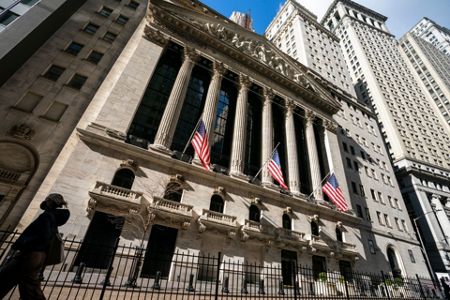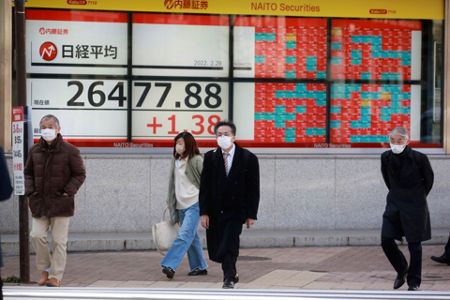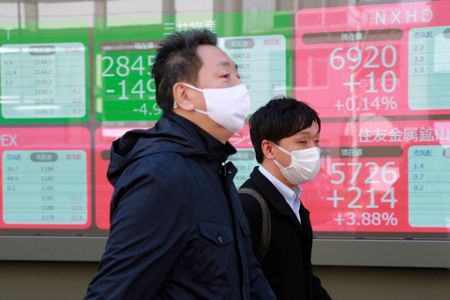NEW YORK (AP) — Markets quivered Monday amid worries about how high oil prices will go and how badly the global economy will get hit after the U.S. and allies upped the financial pressure on Russia for its invasion of Ukraine. Stocks fell, investors herded into gold in search of safety and the Russian ruble tumbled to a record low below a penny at one point.
The S&P 500 was 0.7% lower in morning trading after Western allies moved over the weekend to block some Russian banks from a key global payments system. The U.S. Treasury Department also announced new and powerful sanctions that could immobilize any assets of the Russian central bank in the United States or held by Americans.
The Biden administration said Germany, France, the UK, Italy, Japan, European Union and others will join the U.S. in hitting Russia’s central bank, which said the Moscow stock exchange would remain closed Monday.
Oil prices on both sides of the Atlantic climbed more than 4% amid concerns about what the worsening tensions will do to crude supplies because Russia is one of the world’s largest energy producers. Prices also rose for natural gas, wheat and other commodities, adding further pressure to the already high inflation squeezing wallets around the world.
In search of safer returns, investors plowed into U.S. government bonds, which drove the yield of the 10-year Treasury down 0.11 percentage points to 1.87%, on pace for one of its sharpest drops since the omicron coronavirus variant first rattled investors. Gold rose 1.6%.
They’re just the latest severe swings for markets, which were relaxing in relief just on Friday, in part on thoughts that sanctions against Russia at the time weren’t as severe as they could have been. More sharp turns are likely ahead given all the uncertainty about the war.
President Joe Biden said last week he wants to limit the pain for U.S. households at the gasoline pump, which some investors took as reluctance to go hard after Russia's oil exports. White House press secretary Jen Psaki echoed those comments in an interview with ABC over the weekend, saying the White House wants to minimize the effects on global markets. But she also said “energy sanctions are certainly on the table” still.
The pressure on Russia isn't coming only from governments. London-based energy giant BP said Sunday it would dump its investment in Rosneft, a Russian energy company. BP has held a nearly 20% stake in Rosneft since 2013, and its shares listed in London fell 5%.
European stocks broadly have fallen more sharply than their U.S. counterparts given how much more closely tied Europe’s economy is to Russia and Ukraine. Germany’s DAX dropped 1.8%, France’s CAC 40 fell 2.5% and the FTSE 100 in London lost 1.3%.
In the U.S., the Dow Jones Industrial Average was down 304 points, or 0.9%, at 33,754, as of 10:41 a.m. Eastern time. The Nasdaq composite was 0.1% lower after erasing an earlier loss of 1%.
Markets had already been on edge before Russia’s invasion, worried about how the Federal Reserve looks certain to raise interest rates next month for the first time since 2018. Such a move would help rein in the highest inflation U.S. households have seen in generations, but it would also put downward pressure on all kinds of investments. If the Fed raises rates too high, it also risks causing a recession.
Financial analysts say wars and other such scary geopolitical events tend to have only a temporary effect on markets, perhaps lasting weeks or months. But in the moment, fear is rising.
Putin's order that Russian nuclear weapons stand at increased readiness to launch ratcheted up tensions with Europe and the United States and revived dormant fears from the Cold War era. A measure of how worried Wall Street investors are about upcoming swings in S&P 500 prices rose nearly 11%.
The Russian central bank raised its key rate to 20% from 9.5% in a desperate attempt to shore up the plummeting ruble and prevent a run on banks. That brought a temporary reprieve for the Russian currency.
The ruble plunged at one point plunged below 0.9 cents before climbing back to a shade above a penny, though still down nearly 15%. At the start of the year, a ruble was worth 1.33 cents.
The ruble had plunged more than 30% after the move to block Russian banks from the SWIFT payments system. Among other things, the sanctions are meant to crimp the Russian central bank’s access to over $600 billion in reserves and hinder its ability to support the ruble.
A weaker ruble is expected to cause inflation to surge, potentially angering Russians whose budgets will be stretched by soaring prices. It will also add to strains across Russia's financial systems.
___
AP Business Writer Yuri Kageyama contributed.
Copyright 2022 The Associated Press. All rights reserved. This material may not be published, broadcast, rewritten or redistributed without permission.






